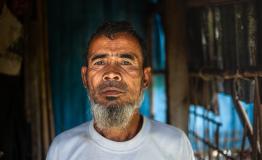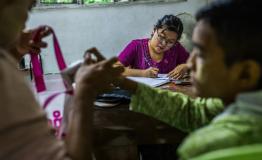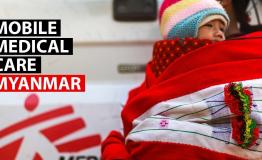![June 2018: A group of Rohingya refugees await assignment to their new homes in in the Kutupalong camp, Cox's Bazar. [© Pablo Tosco/Angular ] June 2018: A group of Rohingya refugees await assignment to their new homes in in the Kutupalong camp, Cox's Bazar. [© Pablo Tosco/Angular ]](/sites/default/files/styles/card_half/public/msf235448_medium.jpg?itok=REEQMAms)

Myanmar
MSF teams continue to care for HIV, tuberculosis and hepatitis C patients, provide basic healthcare and reproductive and sexual healthcare services, and to respond to medical emergencies.
We pioneered HIV treatment in Myanmar – at one point becoming the largest provider of antiretrovirals in the country – and steadily grew a large patient cohort. In 2015, we began working with the Ministry of Health to transfer patients to the decentralised National AIDS Programme, so people can receive care closer to home. This has been suspended since the military seized power, and we are now seeing those patients return to us in greater numbers at our clinics in Shan, Kachin and Tanintharyi.
Despite restrictions on humanitarian access to conflict-affected areas, we have mobile teams based in Sittwe and Maungdaw in Rakhine state, who offer basic healthcare. They also arrange emergency referrals for patients from all communities, including those forcibly detained in camps.
Our Activities in 2021 in Myanmar
1,165
1,165
€15.8 M
15.8M
1,992
1,992

The Myanmar military seized power from the democratically elected government in February 2021, imprisoning its leaders and imposing a state of emergency on the country. Days later, medical staff walked out of their jobs in protest, spearheading the civil disobedience movement that saw government employees of all stripes go on strike. Thousands of doctors and nurses are now in hiding, unable to practise for fear of attack or detention.
Public healthcare services have been in disarray ever since. Treatment for HIV and tuberculosis (TB) have been disrupted, basic healthcare services limited and getting referrals for specialist care has been difficult. When a devastating COVID-19 outbreak hit the country in June, hospitals were quickly overwhelmed, and tens of thousands of people died, unable to access the care they needed.
COVID-19
MSF opened three independent COVID-19 treatment centres to receive patients with moderate to severe symptoms in Myanmar’s biggest city, Yangon, and Kachin state’s Myitkyina and Hpakant townships. In August, we had begun supporting a facility in Lashio, the capital of northern Shan state, but were ordered to close it four days after receiving our first patients, after which they were transferred to a government facility.
We also started a COVID-19 information hotline for people in Muse and Lashio, Shan state, and Dawei, Tanintharyi region; donated supplies to institutions, including Lashio prison; and trained frontline healthcare workers on infection and prevention control measures.
HIV, hepatitis C and tuberculosis
Shortly after the military seized power, we suspended the ongoing transfer of our HIV patients to the Ministry of Health’s programme. We diagnosed and began HIV treatment for new patients in large numbers for the first time since 2019 at our clinics in Kachin and Shan states and Tanintharyi region, as well as continuing care for patients who could no longer access consultations and drug refills at their usual government facilities. We also continued treatment for TB patients and people co-infected with HIV and hepatitis C.
Basic healthcare
We expanded our basic healthcare services, opening clinics to help people on low incomes in Yangon, who have borne the brunt of the economic fallout of COVID-19 and the political crisis. We also added basic healthcare to our clinics in Dawei, Hpakant and Myitkyina, and expanded our referrals for specialist treatment.
Rakhine State
The Rohingya living in Rakhine State have been exposed to cycles of persecution for decades and continue to face discrimination, segregation, extortion and restrictions on movement. As a consequence of their lack of status and rights, the Rohingya also face serious restrictions when accessing basic services, including healthcare.
We continue to run mobile clinics offering basic healthcare, hospital referrals, treatment for sexual and gender-based violence, health education and psychosocial support to Rohingya, ethnic Rakhine and other ethnic groups in Rakhine State. We opened a new fixed clinic in Sin Tet Maw camp, Pauktaw township, improving access to healthcare for internally displaced Rohingya and Rakhine.
We have a team of community health workers in areas we cannot reach in northern Rakhine who provide basic care and referrals for emergency treatment.

105,400
105,4
8,720
8,72
2,540
2,54
29
29
![June 2018: A group of Rohingya refugees await assignment to their new homes in in the Kutupalong camp, Cox's Bazar. [© Pablo Tosco/Angular ] June 2018: A group of Rohingya refugees await assignment to their new homes in in the Kutupalong camp, Cox's Bazar. [© Pablo Tosco/Angular ]](/sites/default/files/styles/card_half/public/msf235448_medium.jpg?itok=REEQMAms)
![Metun (name changed on request) is a Rohingya refugee in the Kutupalong-Balukhali megacamp in Cox’s Bazar, Bangladesh [ © Dalila Mahdawi/MSF ] Metun (name changed on request) is a Rohingya refugee in the Kutupalong-Balukhali megacamp in Cox’s Bazar, Bangladesh [ © Dalila Mahdawi/MSF ]](/sites/default/files/styles/card_half/public/msfimages/news/msf280669_medium.jpg?itok=DDp3fsU8)
A Rohingya refugee in Bangladesh: “The collective fate of the Rohingya is in our hands”

A Rohingya in Central Rakhine, Myanmar: “We hold our frustration inside because we cannot speak out”
![A Rohingya man carries wood through the Kutupalong- Balu Khali mega camp. Cox’s Bazar District, Bangladesh. [© Robin Hammond/NOOR ] A Rohingya man carries wood through the Kutupalong- Balu Khali mega camp. Cox’s Bazar District, Bangladesh. [© Robin Hammond/NOOR ]](/sites/default/files/styles/card_half/public/msfimages/news/msf245171_medium.jpg?itok=vvCT_VN5)
Two Years On: No solutions in sight for the Rohingya

Closure of MSF’s Insein clinic marks milestone for people living with HIV in Myanmar
